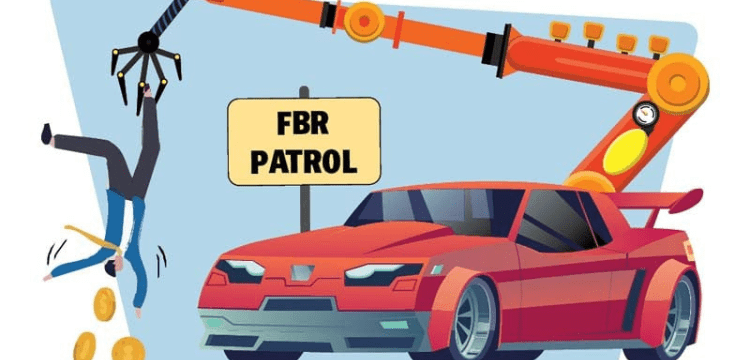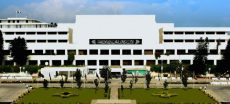[vc_row][vc_column][vc_column_text dp_text_size=”size-4″]ISLAMABAD: The Federal Board of Revenue (FBR), disregarding the austerity measures taken by the prime minister, intended to use a foreign loan intended for an outdated information technology system to upgrade 155 luxury cars at a cost of approximately Rs1.6 billion.
According to official papers, the estimated cost of Rs1.63 billion for the purchase of vehicles is equal to 8.6% of the monies that the FBR had acquired for the replacement of its outdated technology and software. The most obvious component of the scheme is that these automobiles will be purchased with a World Bank loan in the name of taxpayer convenience.
The FBR experienced one of the biggest data hacking events in its history a few years ago, yet despite this, it hasn’t been able to improve its data network.
According to information, the FBR has filed paperwork to the Ministry of Planning for the $400 million Pakistan Raises Revenue project’s Investment Project Financing (IPF) component, which is worth Rs19.6 billion.
A closer look at these records showed that the FBR plans to purchase 155 vehicles with engines ranging from 1,500 cc to 3,000 cc, which the FBR itself has referred to as “luxury” and subject to high taxes. In the records, the FBR has not specified the vehicle’s manufacturer.
According to information, a significant portion of the Rs19.6 billion that the FBR has requested, or Rs1.63 billion or 8.6%, would be used to purchase these vehicles. The planning ministry, however, voiced opposition to the purchase in a recent meeting. Before the Central Development Working Party (CDWP) meeting, there will be another meeting to obtain the ministry’s consent (Thursday).
At the previous exchange rate of Rs220 to the dollar, the FBR calculated that each vehicle would cost around $47,000, or Rs10.3 million. The overall cost of the acquisition may be significantly higher than even Rs1.63 billion as a result of the weakening of the rupee and recent price increases by car manufacturers.
Due to the dire economic circumstances in the nation, Prime Minister Shehbaz Sharif has declared plans to pursue an austerity regime. Ishaq Dar, the finance minister, proposed a Rs170 billion mini-budget on Wednesday, but his revenue division appears eager to buy automobiles and use tax dollars for its own advantages.
Following a report, Dar has already prevented the FBR from utilising the Point of Sale (PoS) revenues for personal gain.
A national austerity committee last week also advised the prime minister to impose a purchasing restriction on all automobiles until June 2024.
The FBR uses the Universal Self-Assessment system, which gives the taxpayer complete authority over how much income to declare. The FBR imposes higher income tax rates on non-filers, yet despite having their information, the FBR rarely pursues them—vehicle or no automobile.
Before this report was published, the FBR spokesperson’s responses were still needed.
The specifics demonstrated how the vehicles would be divided among all field formations. The regional tax offices located in Faisalabad, Gujranwala, Islamabad, Lahore, and Karachi would each get a maximum of nine cars.
Peshawar, Quetta, and Rawalpindi are a some of the regional offices that will receive eight trucks.
The FBR stated in its documents that it plans to start tax compliance initiatives, including behavioural nudges and ease registration, filing, and payment of taxes by reaching out to taxpayers in selected areas in phases, where digital access to services is patchy or other geographical, social, or cultural factors restrict traditional ways of assisting the taxpayers.
However, it doesn’t seem like these arguments support the purchase of 155 luxury vehicles.
The planning ministry has expressed opposition to the FBR’s decision to purchase these cars in its technical assessment and questioned the FBR about the “need” and price. The ministry said that outsourcing tax facilitation facilities would be preferable to purchasing these vehicles.
The planning ministry also took issue with the $3 million budgeted for employee capacity building, training, and seminars. The suggested amount for the project management operational costs is Rs320.4 million (i.e., Rs30 million for the hiring of vehicles, Rs18 million for fuel, and Rs30 million for project contract staff).
The Planning Commission has noted that these objectives might not be accomplished by the deadline, which is June 2024, despite the World Bank having approved the project to increase the revenue base and upgrade the outdated data networks.
“The sponsors, after a lapse of two years, have submitted the revised PC-I with new requirements of equipment and with enhanced costs. Only Rs92 million (i.e., less than 1% of the original cost) has been utilised within two years i.e., up to June 30, 2022, therefore, the sponsors may clarify whether they will be able to utilise the remaining cost of the project Rs19.5 billion up to June 2025,” according to the ministry.
Many had opposed the Pakistan Tehreek-e-Insaaf (PTI) government’s move to take the $400 million WB loan in the name of the tax reforms, fearing that it might also cause a wastage of foreign loans, as had happened in the case of the failed $149 million Tax Administration and Reform Project (TARP). The TARP funds had been utilised to buy cars, computers and to upgrade offices.
The Pakistan Raises Revenue money now may also be used to buy cars, computers and laptops. The Rs9.6 billion cost includes spending of Rs596 million on 1,300 desktops and 600 laptops.[/vc_column_text][/vc_column][/vc_row][vc_row][vc_column][vc_column_text]
[/vc_column_text][/vc_column][/vc_row]











